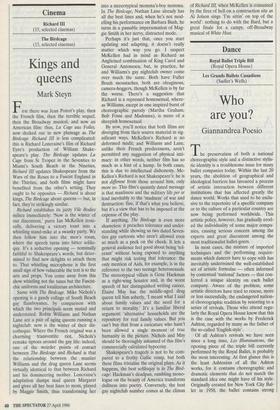Cinema
Richard III (15, selected cinemas) The Birdcage (15, selected cinemas)
Kings and queens
Mark Steyn
First there was Jean Poiret's play, then the French film, then the terrible sequel, then the Broadway musical, and now an American film: thus, La Cage aux Folles, now decked out in new plumage as The Birdcage. Richard III is less complicated: this is Richard Loncraine's film of Richard Eyre's production of William Shake- speare's play. The Birdcage updates La Cage from St Tropez in the Seventies to Miami's South Beach in the Nineties, Richard III updates Shakespeare from the Wars of the Roses to a Fascist England in the Thirties, and both films might have benefited from the other's setting. They ought to be opposites — Richard is about kings, The Birdcage about queens — but, in fact, they're strikingly similar.
Richard establishes its jazzy Vile Bodies milieu immediately: 'Now is the winter of our discontent,' purrs Ian McKellen ironi- cally, delivering a victory toast into a whistling stand-mike at a swanky party. We then follow him into the men's room, where the speech turns into bitter solilo- quy. It's a seductive opening — nominally faithful to Shakespeare's words, but deter- mined to find new delights to attach them to. That whistling microphone is the first small sign of how vulnerable the text is to the sets and props. You come away from this show whistling not the tunes but the Fascist- chic uniforms and totalitarian architecture.
Same with The Birdcage. Mike Nichols's opening is a gaudy collage of South Beach gay flamboyance, by comparison with which the two principals seem muted and understated. Robin Williams and Nathan Lane are a pair of aging queens running a nightclub: now is the winter of their dis- cotheque. Where the French original was a charming transvestite riot, Nichols's remake tiptoes around the gay life: indeed, one of the weirder points of contact between The Birdcage and Richard is that the relationship between the manlier Williams and the drag queen Lane seems virtually identical to that between Richard and his domineering mother. Loncraine's adaptation dumps mad queen Margaret and gives all her best lines to mom, played by Maggie Smith, thus transforming her Into a stereotypical momma's-boy momma. In The Birdcage, Nathan Lane already has all the best lines and, when he's not mod- elling his performance on Barbara Bush, he turns in a passable impersonation of Mag- gie Smith in her nervy, distracted mode.
Perhaps it's just that, once you start updating and adapting, it doesn't really matter which way you go. I suspect McKellen had in mind as Richard an Anglicised combination of King Carol and General Antonescu, but, in practice, he and Williams's gay nightclub owner come over much the same. Both have Fuller Brush moustaches, both are oleaginous, camera-hoggers, though McKellen is by far the worse. There's a suggestion that Richard is a repressed homosexual, where- as Williams, except in one inspired burst of choreographic parody (Martha Graham, Bob Fosse and Madonna), is more of a sheepish homosexual.
By now, you'll notice that both films are diverging from their source material in sig- nificant ways. McKellen's Richard is no deformed misfit; and Williams and Lane, unlike their French predecessors, aren't permitted any suggestion of physical inti- macy: in other words, neither film has so much as a hint of a hump. In both cases, this is due to intellectual dishonesty. Mc- Kellen's Richard is not Shakespeare's: he is not different from those around him, only more so. This film's quaintly dated message is that manliness and the military life per se lead inevitably to the 'madness' of war and destruction: fine, if that's what you believe, but it's a view that has to be imposed at the expense of the play.
If anything, The Birdcage is even more shameless: it preaches tolerance and under- standing while showing us two dated Seven- ties gay cartoons who aren't allowed even so much as a peck on the cheek. It lets a general audience feel good about being 'tol- erant' without being exposed to anything that might risk testing that tolerance: the only mention of Aids, for example, is in the reference to the two teenage heterosexuals. The stereotypical villain is Gene Hackman as a right-wing Senator and, in the worst speech of her distinguished writing career, Elaine May has the middle-aged drag queen tell him soberly, 'I meant what I said about family values and the need for a return to morality.' It's a familiar liberal argument: 'alternative' households are the repository for real family values. But you can't buy that from a caricature who hasn't been allowed a single moment of true humanity in the picture. Nichols and May should be thoroughly ashamed of this film's commercially calculated hypocrisy.
Shakespeare's tragedy is not to be com- pared to a frothy Gallic romp, but both these films trivialise the original plays. As it happens, the best soliloquy is in The Bird- cage: Hackman's deadpan, rambling mono- logue on the beauty of America transforms dullness into poetry. Conversely, the best gay nightclub number comes at the climax of Richard III, when McKellen is consumed by the fires of hell on a construction site as Al Jolson sings 'I'm sittin' on top of the world': nothing to do with the Bard, but a great finale for a campy, off-Broadway musical of White Heat.


























































 Previous page
Previous page